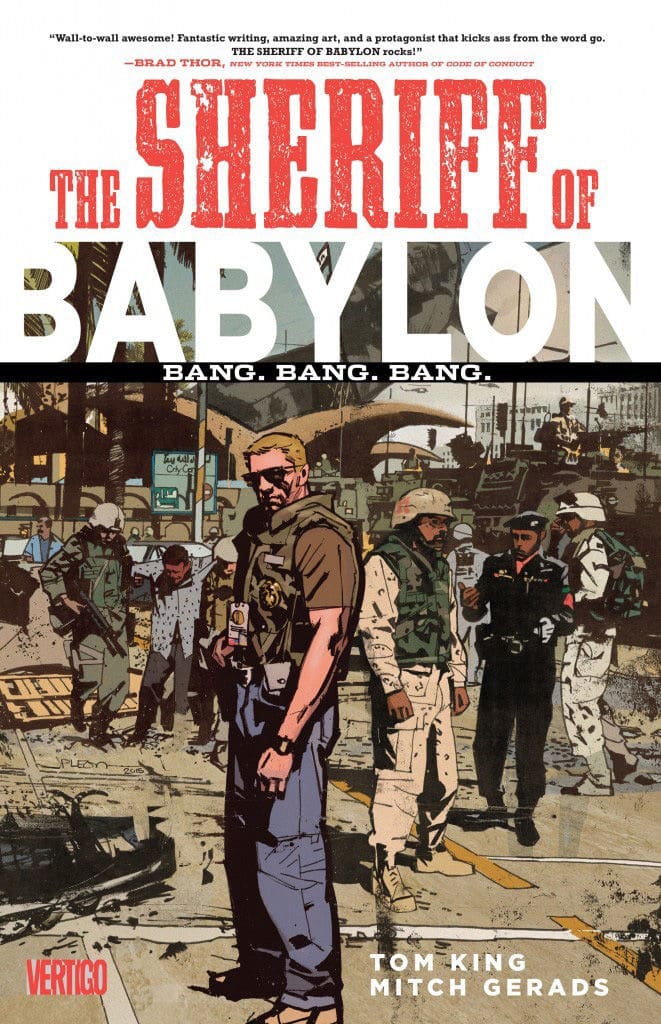For Tom King, writing about superheroes in impossible situations comes easy. But sifting through his memories of his time in Iraq and finding a story to tell would prove much more difficult.
King, a Washington, D.C.-area native who most recently had the challenging task of becoming DC Comics’ new Batman writer following Scott Snyder’s popular run, finally wrote about his time in the war-torn country 10 years after leaving it. He only spent five months of his seven-year CIA career there, but it took him a decade to feel ready.
King’s thoughts kept returning to the Green Zone, an American base of operations in Iraq where he spent most of his time in the country.
“(The Green Zone) was this sort of Casablanca atmosphere of a place trying to hold itself together while it is falling apart,” King told The Washington Post.
King decided to make a war-story pitch to Vertigo Comics (a mature imprint of DC Comics, and where he had interned years earlier) after fondly remembering scanning pages of the Vertigo hit “Preacher.”
Vertigo liked the idea of a fictional Iraq war story told by someone who was actually there, which led to the publication of “The Sheriff of Babylon” last December. It is now a monthly series that is being collected in its first volume, which contains the first six issues.
“Sheriff of Babylon” revolves around three main characters: a former police officer named Christopher who is a contractor in Iraq, training their new police force; an Iraqi woman, Sofia, who was raised in the United States and is now working with both the American and Iraqi governments, always dealing in her best interests; and Nassir, a former police officer under the regime of Saddam Hussein, who is an investigator with a dark past.
A murder brings these three characters together.
“(They) come together to solve a (case) that seems simple and easy, just like the war seemed simple and easy at one point. And then everything goes wrong, just like the war did,” King said. King describes plotting “Sheriff of Babylon” as “PSTD-riffic,” saying one particular issue that featured torture was very difficult to look at when he received the pages.
“It’s hard to write,” King said.
King said his brain absorbs the memories of his time in Iraq differently than it does other moments of everyday life.
“It’s like all the adrenaline that’s running through you (when in Iraq) makes your brain process what happens to you every day. I can remember exactly what the steak sauce tasted like back in Iraq, but I can’t remember what I had for dinner last night,” King said. “It’s very easy to go back to (Iraq), but you kind of don’t want to at the same time. It’s a confusing process. Hopefully it’s a little therapeutic for myself and for the audience as well — to read something from a guy that was there.”
Despite having enough memories to create a fictional war story, King says there are some moments that are off-limits and will never be seen in the comics’ pages.
“There are experiences I have that I won’t touch because I know they’re classified. There are things that have happened to me that I can’t tell my wife about, much less the audience of comics,” King said. “I’ll never write about sources or methods of how I use things. I would never write about specific people I met because when I met those people, the reason they were willing to meet me is because I promised them (confidentiality), and I’m gonna keep that promise.”
King collaborated with artist Mitch Gerads on “Sheriff of Babylon,” whom he says has the perfect style to bring the gritty realism of the series to visual life.
“I followed (Mitch) for years and I knew that he was one of the best modern military comic artists,” King said. “(Mitch has) made this (series) his own and he’ll make it something special.”
The duo are approaching the production of the comic like a television series.
“We’re trying to bring in this idea of how good television is nowadays with ‘The Wire,’ ‘Game of Thrones,’ ‘Breaking Bad,’ (and bring that) kind of energy into the comic,” King said. The first “season” of “Sheriff of Babylon,” according to King, will be 12 issues — No. 8 was released July 6 — and will conclude the mystery that began with the first issue. King hopes that what follows will be in the tradition of many Vertigo series that lasted for years.
“We’re open for a bunch of follow-up seasons,” King said. “Every creator wants to do these long Vertigo runs, like ‘Preacher,’ ‘Y: The Last Man,’ ‘Scalped’ — these 60-, 70-issue Vertigo runs. It’s my ambition to do one of those with this concept.”
Another war story King wrote garnered him a nomination for an Eisner Award this year heading into San Diego Comic-Con. With “Black Death in America,” King and artist John Paul Leon told the tale of a black World War I soldier nicknamed Black Death, who almost single-handedly took on a group of German soldiers, came out of the attack alive, and came back to a United States not ready to honor a black man as a hero. King never assumed anyone would see the story, let alone nominate it for the comic-book industry’s biggest honor.
Despite his time in a battle-stricken nation, King’s Eisner nod illuminated a different kind of stress.
“I’ve never been nominated for anything before,” King said. “I’m nervous.”






